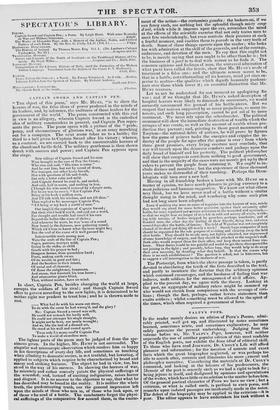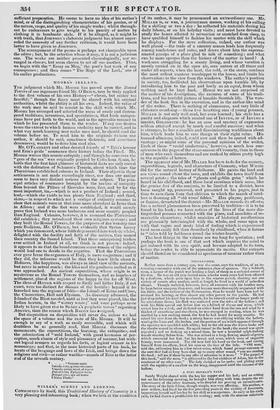VALPV'S POPE.
IF the reader merely desires an edition of POPE'S Poems, admi- rably printed, well got up, and illustrated by notes sometimes learned, sometimes acute, and sometimes explanatory, he may safely patronize the present undertaking. Judging from the volume before U3, Mr. VALPY'S Pope, however, will neither supersede the use of another popular edition of this most readable of the English poets, nor exhibit the beau ideal of editorial skill. To those who have read JOHNSON, Dr. CROLY'S Life will afford pleasure and information ; for the mention of minute and exact facts which the great biographer neglected, or was perhaps too idle to search after, corrects and illustrates his more ;.;eneral and philosophic narrative. Considering the materials at Dr. CROLY.S. command, and looking at the labours of his predecessors, the Memoir of the poet is scarcely such as we had a right to look for ;. being jejune in itself, and disfigured by opinions and speculations of the writer, which have little or no relation to the matter before him. Of the general poetical character of POPE we have no view ; but a criticism, or what is called such, is prefixed to each poem, and remarks upon isolated passages are incidentally made in the notes. The defect of the biography may be applied to the criticism—it is poor. The editor appears to have undertaken his task without a
sufficient preparation. He seems to have no idea of his author's mind, or of the distinguishing characteristics of his genius, or of the nature, scope, and quality of his single works ; whilst through- out he endeavours to give weight to his paucity of matter by clothing it in bombastic style. If it be alleged, as it might be with truth, that JotiresoN's elaborate judgment has almost super- seded the necessity of any further criticism, it would have been better to bare given as JOHNSON. The arrangement of the poems is perhaps not chargeable upon the editor; but, be the selection whose it may, it is not a judicious one. The works are neither presented chronologically, nor ar- ranged in classes, but seem chosen to set off one another. Thus, we begin with the " Essay on Man," the poet's last work of any consequence; and then comes " The Rape of the Lock," one of his earlier productions.



























 Previous page
Previous page